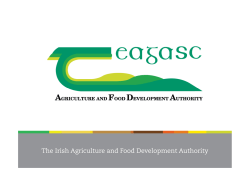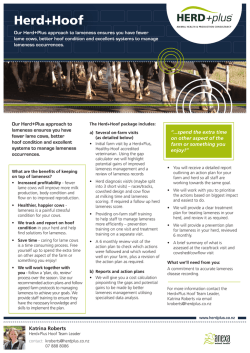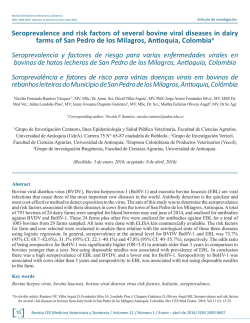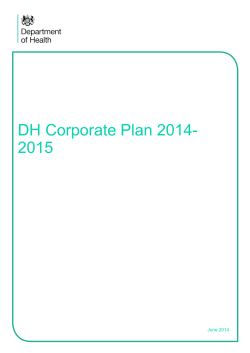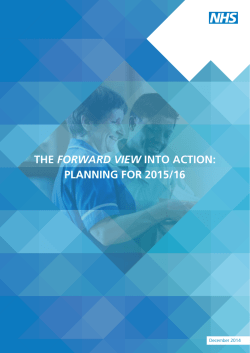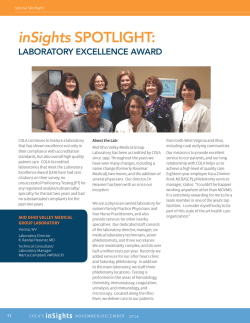
Testing for herds with Negative Herd Status
Reduced cost testing for Negative Herd Status herds in 2015 The following laboratories have indicated that they are prepared to offer a reduced price for the testing in herds which have achieved Negative Herd Status. This price reduction is possible as a result of the much lower likelihood of positive results being obtained from herds which have achieved NHS status. The table below summarises the prices available to NHS herds from these laboratories in 2015. Other laboratories may also in due course offer reduced-cost testing to herds with NHS and an updated price listing will be maintained on the AHI website (http://www.animalhealthireland.ie/page.php?id=97). If the laboratory that you currently use is not listed, you may contact it to enquire about reduced prices that may be available to existing customers. Alternatively, you may contact one of the laboratories listed below to make arrangements to avail of reduced cost testing. A decision on the availability of alternative testing strategies in 2016, with the potential for further reductions in cost, will be made over the course of next year, taking into account further progress in reducing the disease prevalence nationally. For further information contact the BVD Helpdesk on 076 1064590 THE PRICES BELOW RELATE TO THE TESTING OF NEGATIVE HERD STATUS (NHS) HERDS ONLY Name of laboratory Contact Address Farm Lab Diagnostics Emlagh, Elphin, Co. Roscommon. Irish Equine Centre Johnstown, Naas, Co. Kildare. Southern Scientific Dunrine, Killarney, Co. Kerry Vanessa Moffatt 071 96 30792 [email protected] Prof. Ann Cullinane 045 866 266 [email protected] Kieran O’Donovan 064 6633922 [email protected] Maximum unit cost (Including VAT) €2.50* €2.50** €2.50 * Available until end of February for pre-paid samples ** Price quoted is for pre-paid service or by contract Page 1 of 2 Issued by: AHI 20150121 BVD COMNHSDIALAB v1.5 Issue date 28.01.2015 FOOTNOTE IMPORTANT INFORMATION ON HERD BIOSECURITY Qualification for Negative Herd Status (NHS) is a significant milestone, and every precaution should be taken to prevent the introduction of the virus through direct or indirect means. Typically, animals introduced into the herd present the greatest risk of acquiring BVD infection. While this risk is decreasing as the national prevalence decreases and the proportion of animals traded that have a negative test result increases, it should not be overlooked. Imported animals from countries which are not BVD-free are of particular concern. Animals bought from other herds with NHS should pose the lowest risk. If your herd is managed in close association with another herd or herds which do not yet have NHS, then particular attention should be paid to movements and contacts with those herds. It is recommended that all added animals are quarantined before being introduced into the main herd, with testing at a minimum of all those with an UNKNOWN status on ICBF. It is important to note that such testing is also a requirement for the maintenance of NHS. Pregnant animals represent a particular threat, and it is recommended that these are isolated until their calves are born and tested. The risk of purchasing a Trojan animal in markedly reduced by avoiding purchase from herds that have had a PI in the preceding 12 months.Contact with cattle from other herds, either directly or indirectly, should also be minimised. It is especially important that pregnant stock avoid such contact, particularly during the first half of pregnancy, since infection at this time will result in the creation of PI calves. Contact between your cattle (especially pregnant animals) and visitors should be minimized, particularly with individuals who have a high level of contact with cattle in other herds. Where this cannot be avoided, you should enforce strict hygiene in relation to hands, boots, clothing, and equipment and consider providing protective clothing (including boots) and equipment for visitors. You should also be aware that if you have contact with cattle in other herds, you should take similar measures to avoid accidental introduction of infection to your own herd. For further details on herd biosecurity, including quarantine, see the AHI website (http://www.animalhealthireland.ie/page.php?id=31). It is recommended that you complete a biosecurity review, including the role of vaccination, with your own veterinary practitioner. For further information contact the BVD Helpdesk on 076 1064590 DISCLAIMER: no biological test is 100% accurate. If an inaccurate result is suspected, the animal should be isolated and re-tested. All designated laboratories are independently accredited for BVD testing and the test methods used (ELISA or RT-PCR) will, in the great majority of cases, accurately detect the presence or absence of virus in tissue and blood samples when submitted and tested correctly. However, results relate only to the sample as received by the laboratory and, whilst laboratories warrant that their tests will meet their applicable declared specifications, the laboratories make no other warranty, expressed or implied and accept no responsibility or liability in respect of false results which are within the limits of the declared specifications of the tests offered. No representation or warranty is given by AHI, ICBF, the Technical Working Group, the Implementation Group or any member, employee or other person connected with any of the foregoing bodies as to the accuracy of any BVD test methods or test results. Neither AHI, ICBF, the Technical Working Group, the Implementation Group nor any member, employee or other person connected with any of the foregoing bodies shall have any liability or responsibility in respect of any laboratory or the accuracy of any test methods, test results or reports produced by any laboratory. Page 1 of 2 Issued by: AHI 20150121 BVD COMNHSDIALAB v1.5 Issue date 28.01.2015
© Copyright 2026
